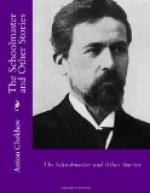“Look here, ticket-collector!” the engineer begins, addressing Podtyagin. “Your behaviour to that invalid passenger has revolted all who witnessed it. My name is Puzitsky; I am an engineer, and this gentleman is a colonel. If you do not apologize to the passenger, we shall make a complaint to the traffic manager, who is a friend of ours.”
“Gentlemen! Why of course I . . . why of course you . . .” Podtyagin is panic-stricken.
“We don’t want explanations. But we warn you, if you don’t apologize, we shall see justice done to him.”
“Certainly I . . . I’ll apologize, of course. . . To be sure. . . .”
Half an hour later, Podtyagin having thought of an apologetic phrase which would satisfy the passenger without lowering his own dignity, walks into the carriage. “Sir,” he addresses the invalid. “Listen, sir. . . .”
The invalid starts and leaps up: “What?”
“I . . . what was it? . . . You mustn’t be offended. . . .”
“Och! Water . . .” gasps the invalid, clutching at his heart. “I’d just taken a third dose of morphia, dropped asleep, and . . . again! Good God! when will this torture cease!”
“I only . . . you must excuse . . .”
“Oh! . . . Put me out at the next station! I can’t stand any more . . . . I . . . I am dying. . . .”
“This is mean, disgusting!” cry the “public,” revolted. “Go away! You shall pay for such persecution. Get away!”
Podtyagin waves his hand in despair, sighs, and walks out of the carriage. He goes to the attendants’ compartment, sits down at the table, exhausted, and complains:
“Oh, the public! There’s no satisfying them! It’s no use working and doing one’s best! One’s driven to drinking and cursing it all . . . . If you do nothing—they’re angry; if you begin doing your duty, they’re angry too. There’s nothing for it but drink!”
Podtyagin empties a bottle straight off and thinks no more of work, duty, and honesty!
A TRIPPING TONGUE
NATALYA MIHALOVNA, a young married lady who had arrived in the morning from Yalta, was having her dinner, and in a never-ceasing flow of babble was telling her husband of all the charms of the Crimea. Her husband, delighted, gazed tenderly at her enthusiastic face, listened, and from time to time put in a question.
“But they say living is dreadfully expensive there?” he asked, among other things.
“Well, what shall I say? To my thinking this talk of its being so expensive is exaggerated, hubby. The devil is not as black as he is painted. Yulia Petrovna and I, for instance, had very decent and comfortable rooms for twenty roubles a day. Everything depends on knowing how to do things, my dear. Of course if you want to go up into the mountains . . . to Aie-Petri for instance . . . if you take a horse, a guide, then of course it does come to something. It’s awful what it comes to! But, Vassitchka, the mountains there! Imagine high, high mountains, a thousand times higher than the church. . . . At the top—mist, mist, mist. . . . At the bottom —enormous stones, stones, stones. . . . And pines. . . . Ah, I can’t bear to think of it!”




